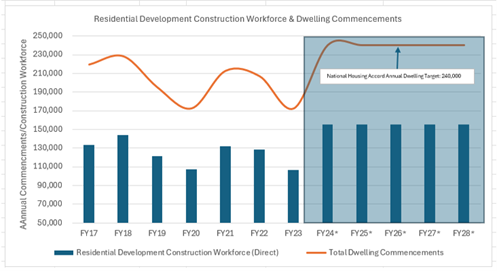Urban Development Institute of Australia (UDIA) responded to the Australian Bureau of Statistics release on the latest Australia’s population growth numbers, acknowledging that while our population grew by 2.5 per cent to 26.8 million people, in the year to 30 September 2023, it’s the skills gap that will need to be a key focus for several years to build back capacity the construction and urban development sector has lost over the past few years.
“The development industry (like many) is experiencing major cost increases and delays from skilled worker shortages – capacity has reduced right when we need to building more homes than ever. We clearly need a continued focus on skilled migration, with a greater focus on migrants that can contribute the critically important skills needed by our industry, particularly the construction workers and tradespeople,” said Col Dutton, UDIA National President.
Immigration remains crucial for the economy – Net Overseas Migration (NOM) historically accounts for about 60% of the population growth needed to sustain a vibrant economy in Australia.
UDIA congratulates Government on expanding the immigration policy in recognition of the problem, but even with a record immigration influx of circa 549,000 growth in the 12 months to September 2023, we still have permanent skilled visa arrivals 19% lower than pre-Covid (based on a 12 month volume comparative basis to February 2024) and construction job vacancies are 72% higher than the long run average.
In our UDIA National Policy Platform – Supply. Support. Sustainability … pathways to productivity, we have outlined key strategies that will help us attract the labour capacity needed to house our growing population and balance new housing supply with the immigration influx, as well as ramping up our education and training to address the skills shortage.

Source: UDIA; ABS; EY
Some actions outlined in our Policy include:
- Fast-track visas for migrant construction workers with house trade skills to help industry recover productivity from continuing shortages – apprenticeships are a 3 year solution.
- Allow accelerated migration for migrants who agree to take on a domestic apprentice within 12 months.
- Allow Head Contractors to sponsor migrants – only allowing sub-contractors to do this, slows capacity growth.
- Ensure the increased housing demand from migration is incorporated in housing targets set through settlement strategy to ensure it does not worsen the housing supply shortage.
- Fund or incentivise State and Territory increases in vocational/TAFE training and apprenticeships through targets to build our domestic skilled workforce.
Our full Policy Platform Document can be found at this link.

